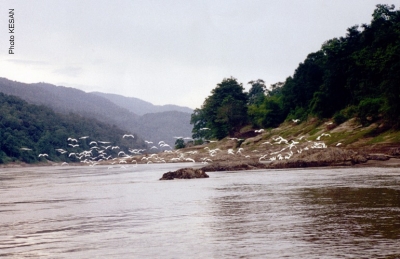Two hundred villagers gathered in worship on Friday at the Salween delta, which for now is the end of a robust waterway that many fear will soon be desiccated. At least 20 hydropower projects have been planned upstream, and locals say that waste from nearby mines is already damaging the river’s delicate ecology.
To mark the International Day of Action for Rivers, 14 March, several coordinated demonstrations sprung up along the channel, with locals from all over Burma uniting to demand complete suspension of all of the six dams planned within Burma for the Salween, which is one of the last and longest free-flowing rivers in the world.
“Once the running Salween is turned into a series of reservoirs, biodiversity will be inevitably destroyed,” said Pianporn Deetes, Salween project director at International Rivers, a worldwide community and environmental protection network.
While a critical mass marched to the delta in Moulmein to perform water-worship ceremonies, many others gathered in Karen State to protest against the controversial Hat Gyi dam, which is expected to flood two wildlife sanctuaries.
Further north, the Karenni Civil Society Network (KCSN) sounded the same call, declaring that the exploitation of resources in the small ethnic state bordering Thailand was “equivalent to a new economic offensive against the Karenni people,” an unfortunate turn after a ceasefire was reached with the Burmese government in March 2012.
Burma Rivers Network, a 15-member alliance of activists, on Friday released a list of nearly 34,000 individuals and 131 civil society groups that unanimously called for total suspension of all hydro projects on the Salween.
[related]
Corporate and governmental stakeholders have not yet responded to the barrage of synchronised dissent, though China’s ambassador to Burma has promised a prompt reply. Companies involved have to date been less than cooperative with both media and activists.
Last month the Shan Human Rights Foundation accused Chinese firm Hanergy Holdings and Burmese contractor Asia World Group of numerous ongoing abuses on and around the site of the Kunlong dam in northern Shan State. To date neither has so much as acknowledged the complaints, and have simply disregarded DVB’s several inquiries, even when channeled through the Chinese Embassy in Rangoon.
Detrimental outcomes of Burma’s mega-hydro projects are many – they are complex and, sadly, they are so oft-repeated that reciting them can be done almost thoughtlessly: environmental destruction; sweeping displacement; and military abuse, particularly against ethnic minorities. Activists argue that, for the people of Burma, there isn’t actually any justification for the projects, and no one — among the Burmese, Chinese and Thai governments, or the companies involved — has offered much evidence to the contrary.
As large-scale development projects go, hydropower megaprojects seem almost universally abhorred. Just this week an Oxford study, baldly titled “Should we build more large dams?”, examined the cost and return of such developments, and concluded that the answer is “no”.
Pianporn, when asked whether large-scale hydropower projects would offer any benefits at all for Burma’s population, nearly 70 percent of which does not have full electrical access, said:
“Not likely. Most of the electricity will be exported, while the real, invisible cost of the dams will be on villagers in Burma.”
Since 2008, two Salween dams have been indefinitely suspended because of public opposition and concerns about human rights. International Rivers confirmed that the Wei Gyi and Da-gwin dams, located on the Thai-Burmese border, have been halted by the sites’ operator, Electricity Generating Authority of Thailand (EGAT).



